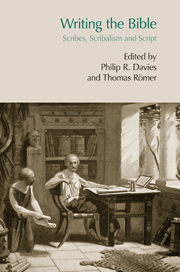Book contents
- Frontmatter
- Contents
- Abbreviations
- 1 Introduction
- I Writing in the ancient world
- II Hebrew Bible and early Judaism
- 4 The dissemination of written texts
- 5 Genesis: a composition for construing a homeland of the imagination for elite scribal circles or for educating the illiterate?
- 6 The “Prophets” as scriptural collection and scriptural prophecy during the Second Temple period
- 7 From prophet to scribe: Jeremiah, Huldah and the invention of the book
- 8 Instituting through writing: the letters of Mordecai in Esther 9:20-28
- 9 The Scribe and his class: Ben Sira on rich and poor
- III Early Judaism and early Christianity
- Index of biblical and other ancient sources
- Author index
9 - The Scribe and his class: Ben Sira on rich and poor
- Frontmatter
- Contents
- Abbreviations
- 1 Introduction
- I Writing in the ancient world
- II Hebrew Bible and early Judaism
- 4 The dissemination of written texts
- 5 Genesis: a composition for construing a homeland of the imagination for elite scribal circles or for educating the illiterate?
- 6 The “Prophets” as scriptural collection and scriptural prophecy during the Second Temple period
- 7 From prophet to scribe: Jeremiah, Huldah and the invention of the book
- 8 Instituting through writing: the letters of Mordecai in Esther 9:20-28
- 9 The Scribe and his class: Ben Sira on rich and poor
- III Early Judaism and early Christianity
- Index of biblical and other ancient sources
- Author index
Summary
INTRODUCTION
Recently, I published a book-length examination of the ideologies and theologies of social justice in the Old Testament, titled Contending for Justice(Houston 2008). That work made no reference to the book of wisdom of Ben Sira, despite the fact that more may be found there on the related topics of social justice, money, work and the relations between rich and poor than in any book of the Hebrew Bible: perhaps about 170 verses. This chapter is a first essay towards repairing this considerable omission.
My method in Contending for Justice, which I will adopt here, relies on an understanding, however precarious, of the social dimensions of the rhetoric. From what class position does the author or authors speak? How do they understand the social position of their audience? How does this affect the way in which the text presents or criticizes class relationships?
An extensive and important study of Ben Sira's teaching on generosity has recently appeared (Gregory 2010), and this takes into account his social setting, although its starting point lies in his theology of retributive justice, cosmic or divine. Benjamin Wright and Claudia Camp (2001) have similar concerns to mine, but they are interested in the supposed conflicted social status of the scribe as a problem for Ben Sira himself, which is not my topic here. Both these works cover much of the same ground as this essay. Gregory's views are fairly close to mine, but I shall have frequent occasion to question those of Wright and Camp.
- Type
- Chapter
- Information
- Writing the BibleScribes, Scribalism and Script, pp. 108 - 123Publisher: Acumen PublishingPrint publication year: 2013

